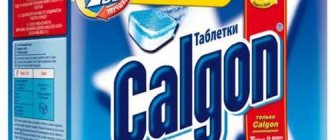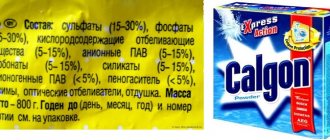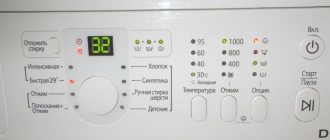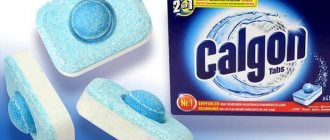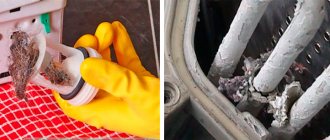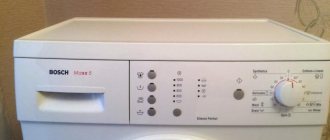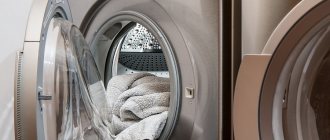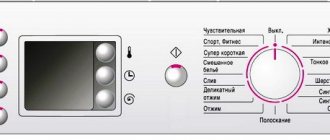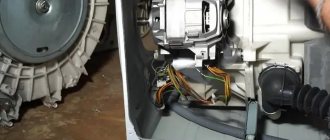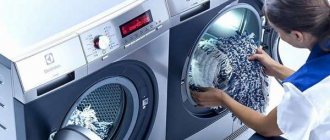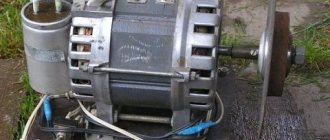Limescale is a real scourge for modern washing machines. The heating element, which is constantly in contact with water, especially suffers from salt deposits. The worse the water in your tap water (hard), the faster plaque builds up. As a result, the machine constantly needs cleaning, and in its absence, repair. That is why humanity has invented such a universal product as anti-scale for washing machines.
Next, we will look at everything related to this cleaning product: composition, types, reviews and analogues that you can make with your own hands.
Procedure for using anti-scale agent
When talking about the procedure for using the anti-scale agent “Antinscale”, it is impossible to unify the instructions. After all, anti-scale is not one product, but a group of products, and they are all different, produced by different manufacturers in various forms and used to clean different materials and surfaces. Let's look at the types of anti-scale products for washing machines
And let’s focus on the order of their use.
Antiscale for washing machines under the Furman brand. A specialized anti-scale agent that protects the drum and heating element of the washing machine from scale and salt deposits. The product does not harm the rubber parts of the machine after a single use. Packaging – 50 g sachet. Dosage – 1 sachet, 1 application. Frequency of use – once every 6 months. Directions for use: pour the contents of the sachet into the empty drum of the machine, select any mode (only with a temperature of 30-40 C) and wash.
Anti-scale for washing machines and dishwashers from Greenfield Rus. The product is intended for quickly cleaning parts of the washing machine and dishwasher from limescale. Packaging – pack of 250 g. Dosage – 60 g per application. Frequency of use – once every 6 months. Directions for use: pour 60 g (no more) of the product into the empty drum of the machine, select a mode with intensive rotation of the drum and a temperature of 40 C and wash.
Liquid anti-scale agent “Cinderella”. Multifunctional liquid product designed for cleaning kettles, pots, dishwashers and washing machines from limescale. When used correctly, the product does not damage the rubber parts of the washing machine. Packaging – 250 ml bottle. Dosage – 2 caps per 1 application. Frequency of use – once every 6 months. Directions for use: mix 2 caps of the product with 1 glass of water, pour the mixture into an empty drum of the machine and start the wash with intensive rotation of the drum and a temperature of 40 C, wait for the end of the washing program.
When planning to clean your washing machine with anti-scale agent, first wear rubber gloves. The product is caustic and may cause a chemical burn if it comes into contact with the skin. If antiscale comes into contact with your skin, eyes, nose or mouth, thoroughly rinse the affected parts of your body with plenty of water.
Pros and cons of using anti-scale in a washing machine
Like any chemical agent, anti-scale agent has its advantages and disadvantages. Our task is to objectively consider these pros and cons and evaluate them. Let's start with the advantages.
- Anti-scale removes lime deposits from the drum and heating element of the washing machine quite quickly. The scale comes off clean on average in 30-40 minutes.
- When used correctly, anti-scale components do not harm the rubber and plastic parts of the washing machine.
- The product is economically used, inexpensive and only needs to be used twice a year.
Antiscale manufacturers and experts themselves point out the following as disadvantages:
- an error in the dosage of the product can have adverse consequences for the washing machine;
- if the product gets on the skin or mucous membranes of the human body, it can be harmful to health;
- When using an anti-scale agent, large pieces of scale may fall off the heating element of the machine. They may well get stuck in the moving parts of the machine and contaminate the laundry.
Typical composition and effect of the drug
To provide emergency assistance to a washing machine, a chemical agent has been developed - anti-scale agent. This is the general name for most anti-scaling products; its analogues are: anti-scaling agent, scale precipitator, etc. The drugs are available in the form of suspensions, pastes, powders and tablets.
The active ingredient in the cleaner is acid. Many manufacturers use citric, sulfamic or oxalic acid. Their specific gravity in the anti-scale composition for washing machines is about 30%.
Additional required components are thiourea and ammonium chloride. In addition to the above ingredients, the composition includes: dyes, flavors and other substances that have a preventive effect.
Antiscale is an independent drug designed to remove already accumulated plaque. The chemical should not be combined with washing clothes. Anti-scale agents should not be confused with preventative agents such as Calgon, aimed at softening water.
The principle of operation of the “destroyer” is extremely simple - acids act on hard deposits and soften them. The deposit peels off from the mechanism parts and is removed with a water stream through the drain hose.
The use of anti-scale to combat scale crust has the following advantages:
- effectiveness of the drug - the result is achieved in one use;
- safety for structural elements - if the dosage is observed, the components of the cleaner do not harm the rubber seal and plastic components of the washing machine;
- economical - the product is enough for several uses.
If we talk about the minuses, it is worth noting the likelihood of clogging the drain channel with large pieces of scale. The remaining disadvantages are associated with non-compliance with the rules for using anti-scale agent - an excessive amount of the product has a negative effect on the rubber seal.
Your first and foremost task is to read the instructions. Depending on the concentration of active substances, the permissible frequency of use and amount of anti-scale agent are determined.
It is better to give preference to liquid products - they dissolve better in cold water and have a more effective effect on salt deposits
Regardless of the chosen chemical, you should adhere to the general rules for using antiscale:
- use at idle speed - without loading laundry;
- recommended washing mode – 30-60°C;
- the drug is poured into a drum or powder cuvette.
More precise recommendations are shown on the packaging. When working with scale precipitator, be sure to use latex gloves to avoid getting a chemical burn. While the heating element is being processed, the room must be well ventilated - forced exhaust must be turned on in the bathroom or kitchen.
Rules for regular cleaning
The dishwasher itself can tell you that it needs cleaning: the volume of its operation changes, the quality of washing dishes changes. But relying on the “talkativeness” of technology is undesirable.
The frequency of cleaning depends on several parameters, individual for each family.
. This:
- Number of dishes loaded.
- Frequency of equipment use.
- Water quality and composition.
- Proportion of fatty dishes on the menu.
- Types of detergents used.
In order for the equipment to serve as long as possible, and the result of its work to be ideal, you must adhere to several rules.
- After each cycle, or at least once a week, leave the machine door open for several hours to allow any remaining moisture to dry and odors to dissipate.
- Before loading dishes, remove any remaining food from them.
- Consider the composition of water when purchasing products and do not purchase cheap, low-quality tablets and liquids.
- Clean the machine manually regularly. It provides more benefits than automatic rinsing.
- Before each cleaning, unplug the equipment to avoid personal injury.
Responsible housewives interested in how to wash the inside of a dishwasher should know that it has eight main components that need to be looked after at certain intervals.
Cleaning the filter and grille
The filter and grille near the drain collect the bulk of the dirt
. Fatty deposits clog all holes and contribute to the appearance of unpleasant odors and even mold.
The filter is a mesh cylinder that is located at the bottom of the dishwasher. In older models, to remove it, you will need to unscrew the screws that secure it; in newer models, no additional tools are needed. The filter is unscrewed from its socket and the grille is easily removed without the use of brute force.
Both parts must be thoroughly washed from grease and food residues using a sponge and detergent, then rinsed under running water and dried. Install dry, clean parts into place, following the marks on the pallet and body. If you have any difficulties, use the instructions to avoid breaking the filter and grille.
Cleaning the blades and seal
The blades are washed with regular dishwashing liquid.
. If food remains are found in the holes, remove them with tweezers or a toothpick.
The axis that ensures the rotation of the structure also needs to be cleaned and only then the clean blades can be attached back
After installation, it is important to make sure that they rotate without any difficulty
Dirt-covered seals not only emit an unpleasant odor, but can also cause leaks. They need to be cleaned with a sponge and detergents; some housewives use soft toothbrushes for more thorough care. After cleaning, rinse off the cleaning agent thoroughly, wipe dry with a cloth and open the door to dry for 2-3 hours.
The baskets of the machine must not only be washed, but also treated with a special sealant in places where the coating is damaged.
Door disinfection
The car door is a place for both dirt and mold to accumulate.
. Often, rust is added to these two problems.
Using a sponge and a regular cleaning agent, remove dirt and grease deposits. You will need to get rid of mold and rust using a toothbrush and special dishwasher cleaning products. After removing coarse dirt, the door must be disinfected.
It is very important not to use household bleaches to get rid of mildew and mold. They destroy the door coating, contributing to an increase in rust spots, and contribute to the deformation of plastic and rubber parts
And if you don’t rinse them off properly, the remaining bleach will end up on the dishes, which will lead to poisoning of all family members. You can prevent the appearance of mold much more successfully if, as a preventative measure, you dry the dishwasher thoroughly after each cycle, leaving the door open for several hours.
Bottom cleaning
Not only food remains can accumulate at the bottom, but also fragments of dishes if the washed cup or plate has a crack.
In order to remove all contaminants, you need to remove all the parts: both the baskets and the blades.
After this, remove large debris and clean the surface with a toothbrush and gel detergent. Then rinse thoroughly with clean water and let dry.
How to clean heating elements with anti-scale
There are 2 ways to clean a washing machine:
- Pour (pour) the required dose into the drum.
- Pour (pour) into a dispenser container.
At the same time, there should be no underwear in the SM.
Step-by-step instruction
- Wear gloves.
- Load the product (quantity according to the manufacturer's instructions).
- Start the wash.
- After completing the process, check the filter for the presence of scale fragments.
- Set up the extra rinse process.
Do not overdo the quantity so as not to break the machine. Clean 2-3 times a year.
Scrubman (Russia)
Another well-known domestic drug based on acids with the addition of a complexing agent. According to the manufacturer, the product fights scale at the ionic level and has a disinfecting effect on the internal parts of the unit. In addition to cleansing the heating element from solid deposits, aninakipin Scrubman No. 1 removes unpleasant odors from the drum, destroys fungus and mold.
The consumption of the product depends on the degree of water hardness. If the indicator is not precisely established, then you need to use the dosage as for the average level. An alternative is to focus on the “carrying capacity” of the machine. A bag of dry powder (250 g) is designed for a washing machine up to 6 kg.
Liquid bio-cleaner Scrubman No. 4 consists of an organic reagent; all components of the emulsion are biodegradable and harmless to the environment. The descaling agent has a milder effect compared to Scrubman No. 1 and is recommended for monthly use.
Prevention of carbonate and sulfate precipitation
The appearance of deposits is slowed down by following the manufacturers' recommendations for the operation of SMA: wash in a heating mode of <60ºC, use powders that include anti-scale additives. Excessive loads and incorrectly chosen mode also accelerate the formation of deposits.
Other areas of prevention:
- reduce water hardness using softening filters and demagnetizers;
- refuse to wash heavily worn clothes: fabric particles settle on the heating element;
- do not use powders from an unknown manufacturer;
- Regularly clean the pump filter from accumulated debris.
It is not recommended to use Calgon for prophylaxis for a long time: the substances it contains gradually accumulate on the surface of the heating element and are cemented into a crust of even greater hardness. The result will be known - destruction of the heater.
Composition description of the product Antiscale
To choose a specific product and remove scale with your own hands, it is advisable to find out exactly why this problem occurs, which will help prevent the problem in the future. Every person has encountered such a problem as sediment on the walls of teapots, which appears over time. The inside of the container is literally overgrown with soot, which occurs due to the decomposition of salts when heated. In other words, the formation of harmless carbon dioxide and the plaque itself begins, which consists precisely of insoluble salt.
To prevent the formation of such scale, you will need to soften the water, due to which it is freed from:
- Soleil;
- Calcium;
- Magnesium.
To do this, many people prefer to install special filters that remove the above-mentioned particles. Likewise, if only soft water is supplied to the washing machine and descaling is carried out regularly, then the life of the product can be significantly extended.
Anti-scale removes salt deposits from the metal surface of the washing machine inside and directly from the heating element
Otherwise, once the highest temperature level reaches the maximum level, the likelihood of scale formation will increase significantly
It is important to pay attention to the fact that Adipinka, Cinderella, Sanita or Chistolan are not water softeners, but compositions that can be used to remove scale from the surface of the heating element. To avoid the formation of plaque, you should give preference to a product such as Calgon or Calgonit, which are publicly available for sale and at a fairly reasonable cost. It is worth noting that sometimes water has such strong hardness that even the highest quality composition cannot cope with it.
In this case, both the way to eliminate the problem and to prevent it use products belonging to the Antiscale category
It is worth noting that sometimes water is so hard that even the highest quality composition cannot cope with it. In this case, both the way to eliminate the problem and to prevent it use products belonging to the Antiscale category.
The effect can be seen immediately after the first use, as the heating element and drum become shiny, and you can safely continue to use the product without fear of breakage
It is especially important to maintain the heating element in good condition, as this affects the speed of heating water and saving electricity. The composition of Antiscale can be completely different, for example, it may contain sulfamic acid, a little selenium and similar substances
Working with them is very dangerous, and therefore you must follow the precautions indicated on the packaging
Mechanical cleaning method
It is not recommended to disassemble a washing machine with a valid warranty. The right to service without payment will be lost. For manual descaling, the heating element is dismantled:
- disconnect equipment from the power supply;
- remove the back panel of the washing machine;
- Release the heater from its fastenings and remove it outside.
Clean the heating element using a spatula using gentle scraping movements, being careful not to touch the metal. To make the task easier, you can first soak the device in Antiscale.
Do not use a knife, file, or wire brush. Reassembling the machine is carried out in the reverse order.
What is scale and why is it scary?
Before we fight scale, let’s figure out what it is and how it forms.
As you know, tap water contains a certain amount of salts dissolved in it. Most often these are carbonate salts of calcium and magnesium. The hardness of the water depends on their quantity. Accordingly, the more of these salts dissolved in water, the harder it is. The rate of scale formation in water heating devices depends on the hardness of the water. When water is heated, salts are broken down into carbon dioxide and solid sediment, which settles on the surface of the electric heater (or on the walls of a regular kettle). This sediment is scale.
At first glance, the harm caused by scale is only aesthetic. But this is far from true. A layer of solid sediment reduces the ability of the metal from which the heater is made to conduct heat. Consequently, due to the resulting thermal insulation, the heating element is forced to increase its temperature in order to heat the water. Based on the laws of physics, the resistance of a conductor increases as the temperature increases, and the power decreases. Reducing power leads to increased time for heating water. In simple words, a kettle with scale will heat water longer than without it. In addition, a layer of scale can cause significant overheating of the heating device, which leads to its burnout and failure (typical of washing machines and dishwashers).
Measures to prevent scale formation
Following the recommendations for operating equipment allows you to slow down the appearance of deposits. Basic rules: wash preferably in a mode that heats water to 60°C, use specialized powders for automatic washing machines.
Some measures are aimed at reducing the carbonate hardness of tap water. Let's find out which of them are more effective.
Calgon and analogues: benefit or harm
When thinking about how to prevent the appearance of a crust on the heating element, many people remember the much-advertised Calgon product. However, service center technicians are skeptical about the “miracle” drug.
Calgon is a water softener. The drug does not remove accumulated scale, but changes the characteristics of the liquid. It contains carboxylates, sodium tripolyphosphate, polyethylene glycol and microcrystalline cellulose. Substances suppress the effect of salts and reduce the likelihood of scale formation
In principle, Calgon copes with the task, but is its use really necessary?
Experts' arguments:
- The composition of powders intended for automatic machines already includes water softeners. This means adding Calgona is a waste of money.
- Cheaper analogues have a similar composition and a similar effect: Yplon , Tyron , Alfagon .
- An excess of softener is as harmful as calcium and magnesium salts themselves. The drug is not recommended for continuous use; it is better to avoid it if the machine operates at temperatures up to 60°C.
There is an opinion that the constant use of Calgona and its analogues makes the surface of the heating element hard, as if cemented. Due to the formation of a hard crust, the heater runs the risk of quickly burning out.
Magnetic converter – neutralization of salts
An effective and safe method to prevent the formation of a salt crust is a small-sized insert device with high magnetic induction. An overhead or mortise device is introduced into the water supply system and changes the quality of running water.
The converter operates as follows. Under the influence of a magnetic field, salts crystallize and lose their ability to form groups - to settle on equipment parts.
Small particles formed as the temperature rises are washed away by the liquid flow. The chemical composition of water does not change, the ability of salts to form scale is neutralized
When choosing a magnetic method of prevention, you should take into account a number of nuances of using the converter:
- The device works effectively in a relatively small range, so it must be fixed closer to the washing machine.
- When purchasing a converter, you should ask the seller for a quality certificate indicating the maximum operating temperature. Cheap analogues quickly lose their properties in a warm environment.
- The magnetic cleaner is installed on the cold water supply pipe.
Water treated with a converter can only be used for technical purposes; it is not suitable for cooking. Experts talk about the inhibitory effect of the liquid.
Range of products
On the market of chemical products for descaling washing machines there are many offers from companies in different countries. To characterize the most popular Antinakipinov brands, descriptions are given by manufacturer groups.
Products from domestic manufacturers
This is the most representative category of cleaners in demand. Inexpensive and effective drugs can be purchased at any household chemical store. Here are the first 5 brands:
- Luxus Professional is a liquid cleaner based on aminosulfonic and citric acids. Packaging 500 ml, enough for 2 treatments.
- Selena - available in two forms: emulsion and powder. The recommended cleaning wash temperature is 30–40ºС, frequency of use is quarterly. Violations of the regulations lead to the risk of destruction of the seals.
Do you store laundry in the washing machine?
Oh yes! No.
- Cinderella - most often found in liquid form, but is also available in powder. One 250 ml bottle is poured into the drum without laundry and the mode is set to 40–50ºС.
- "Scrubman" - recommended for monthly use. In addition to descaling, it disinfects and removes odors from the drum, and prevents the formation of fungus and mold. Dosage – 250 g of powder is needed for a machine with a 6 kg tank.
- Un Momento is a concentrated liquid, available in single packaging. The drug is non-toxic and safe for rubber and plastic parts. Cleans at a temperature of 60ºС.
You can also call the brand “Greenfield Rus”, the drug removes limescale well. But the powder has a significant drawback: the packaging is 250 g, and 60 g are needed for 1 cleaning. Exceeding the dosage harms the machine.
Antiscale for SMA
Foreign cleaning powders and liquids
Among the anti-scale agents produced in the near abroad, a powdered cleaner from Ukraine “Furman” in 40 g bags is called. This dose is enough to remove scale from a heating element in 1 cycle at a temperature of 60ºC. The drug is easy to use and inexpensive.
Belarusian famous brands are Doctor TEN and Chistoff. A distinctive feature of the first drug: an antibacterial effect in addition to the main function of cleaning the electric heater from salt deposits.
The second anti-scale agent contains hydrochloric acid, which is highly aggressive, so the cleaner is used less frequently than the first. Scale solvents from foreign countries:
The jointly produced anti-scale products include the Top-Hous brand (Germany/Russia). The powder form of the drug is produced in our country, and the gel form is produced abroad. You can also note the products of Bork, Nast, W5, Tygon factories.
Conclusions on the effectiveness of resisting salt formation
Periodic washing of the washing machine with Antiscale is a prerequisite for extending its service life. The use of citric acid and vinegar instead of industrial preparations is not prohibited.
Manufacturers of household appliances take into account the influence of scale when developing new programs: they provide heating to 40–50ºС while maintaining the quality of washing at the same high level. This ensures the integrity of the heating element and energy savings. Final wishes to users:
- install a filter-softener at the water inlet to the washing machine, use “Antinakipin”;
- once every six months or after each anti-scaling treatment, clean the pump filter from dirt;
- choose a program with a lower water heating temperature.
And in conclusion: “anti-scale” is a good product that quickly cleans washing machine parts from carbonate and sulfate build-ups. But you need to remember that overdose and improper use will lead to collateral destruction of the seals.
Video
How to choose the right cleaner
Before you go to a store or browse online shopping sites where buying goods is not difficult these days, you need to understand what kind of cleaning is required. For prophylaxis, drugs with aggressive components should not be used. If the mechanism is completely new and has never even been used, then the best solution is a product for the first launch. Are we talking about an assistant who has not taken a “bath” for many years? Here, serious processing of all parts will be required, because, most likely, scale has formed on the electric heater, the drum has worn out without cleaning, mold has grown in hard-to-reach gaps - the breakdown of the exhausted mechanism is only a step away.
To purchase the “right” product, you must study the instructions, which present all the characteristics. It’s one thing if the composition includes relatively harmless citric acid, another thing if violent chemicals are used. By the way, if you get lost in the vast assortment, it’s easy to confuse and buy, and then use the product for other purposes. These are the most common mistakes when choosing household chemicals.
The selection criteria are based on five main pillars:
- functional;
- price;
- compound;
- container size;
- efficiency.
How to use anti-scale and clean your washing machine
When thinking about how to use chemicals to descale SM, look at the label of the chosen product. Usually the dosages are written on the bottle or packaging. Each product has its own dosage, this is important. If you buy portioned cleaners, there will be no problems: use 1 dose for 1 cleaning. And for large packages, reading the instructions is mandatory.
There are general rules for using all descaling products:
- The washing machine can only be cleaned when the drum is empty.
- Use the products carefully. Make sure that the chemical does not get on your skin or eyes. Use personal protective equipment: goggles, a respirator, or at least gloves.
- Do not exceed the permissible dosage.
Now you know how to clean your washing machine with anti-scale. But what if you don’t trust store-bought products, but the problem of hard water needs to be solved somehow? Find ideas and tips below.
Folk remedies
Cleaning with citric acid
This option is suitable for cleaning fresh scale. That is, one that has not yet formed a thick layer and has not become hard. Cleaning can be done on any kettle. Suitable for plastic, metal and glass. It is necessary to dissolve 2 tbsp. citric acid (fresh lemon will do) in 500 ml of water. The result will be a solution that is not very aggressive.
Execution order:
- Pour the liquid into the device and boil it.
- Pour in the acid or just take one lemon and squeeze all the juice inside.
- Wait two hours until the liquid cools.
- Shake to dissolve any limescale buildup.
- Pour the prepared mixture
Cleaning with soda
Soda contains phosphoric acid. It perfectly loosens salt deposits on the walls of the kettle. It is better to use colorless drinks, such as Sprite or Schweppes, so as not to paint the inside of the cookware. Before use, the gas must be removed from the drink. This will prevent foam from accumulating.
To do this, you can shake the bottle thoroughly, and then carefully open it, wait a couple of minutes until the abundant release of bubbles ends. Afterwards, the soda must be poured into the device, boiled, then wait until it cools completely. Afterwards we rinse the kettle.
Cleaning with brine
The brine is poured into a kettle and boiled for 25-30 minutes. Then shake the contents and let it cool completely. Using this method, rust and scale are removed well.
How to make antinaikpin with your own hands
It will probably not be a secret to you that the most common means that can be found in everyday life or in any store can fight scale. So, here is a rating of products that can be used instead of store-bought chemicals:
- lemon acid;
- Coca-Cola;
- vinegar essence (diluted).
Do you want to clean your machine cheaply and effectively? Using a “lemon”, pour it directly into the drum (a pack of up to 100 g is enough), and run the wash idle at 40 degrees.
If you want to use Coca-Cola, you will need about 3 liters of the sweet drink. Do you feel bad about pouring a drink into the machine? Ask the store if they have an expired batch - this is also suitable for SMA.
Using vinegar essence, measure out 50 g of liquid, diluting it with half a glass of water. Pour the liquid into the drum, start the 40-degree mode.
Make an anti-scale agent yourself or buy a ready-made product in the store and use it about 2 times a year to protect the machine from breakdowns.
Methods for cleaning a steam generator at home
You can only clean simple gravity steam generators with your own efforts.
Several effective and fairly simple cleaning methods:
- Cleaning with citric acid. For a liter of water you will need two teaspoons of citric acid. The resulting mixture should be poured into the tank, allowed to stand for 10–20 minutes, and then the steam supply should be turned on at full power. While the resulting liquid evaporates, you should iron some piece of fabric so that the solution with scale particles settles on it. After this, rinse the tank with clean cold water. It also needs to be evaporated at full power to cleanse the insides of citric acid.
- Cleaning with acetic acid. To prepare a cleaning solution, you need to take nine percent vinegar and mix it with clean water one to one. Pour the solution into the tank, let it brew and evaporate this liquid in the same way as when cleaning with citric acid. This method should not be used too often because the rubber and plastic parts may deteriorate.
- Cleaning with special descaling agents. The finished powder must be dissolved in clean water. The instructions for this product will help you determine the proportions and further actions.
- Cleaning with dishwashing detergent. Dilute dishwashing detergent in warm water and mix until smooth. Use a microfiber cloth to gently wipe the contaminated areas. After the procedure, wipe the surface with a clean soft cloth to remove any remaining product.
- Cleaning with mineral water. Mineral water should be poured into the tank. Turn on maximum mode and evaporate it completely. After this, you need to repeat the action only with clean water. This method is absolutely harmless to the device and quite effective.
- Cleaning using a steam bath. This method is not easy, but very effective. Suitable if the steam generator has very clogged holes that release steam. You will need a baking sheet and two wooden sticks. They need to be put in a container and the iron placed on the sticks. Pour boiling water so that it only touches the sole. Then add a special descaling agent to the water. Leave for ten minutes. After this procedure, the water will become dirty with grains of scale.
Prevention of scale formation.
It is always easier to prevent a problem than to fix it. In order for the steam generator to last as long as possible, you need to follow simple rules:
- use only filtered water or buy clean water in the store;
- descale the appliance once a month;
- After each use, it is necessary to drain the remaining water from the tank;
- Do not clean the soleplate of the iron with metal sponges;
- Always keep the device dry and clean.
Proper care and timely descaling will extend the life of the steam generator. Also, do not forget to read the instructions that come with the device.
Antiscale safety level
Some users are afraid to use lime dissolving cleaners because they have a “nuclear” composition. Of course, any chemicals are harmful, since the acids they contain can corrode even metal elements.
To ensure safety when using the cleaner, it must be used strictly according to the instructions, maximum once a quarter. If you follow the basic rules and dosage standards, no negative effect will occur.
Some housewives have adapted to using sodium carbonate (soda ash). This is a good option, but it doesn’t always help.
Which brand of anti-scale agent is better to choose?
The TOP includes products from 9 manufacturers with an optimal price-quality ratio. They have been working in the market for quite a long time and have a good reputation. The list of customer favorites includes the following companies:
- Bosch is a German manufacturer of household appliances and large home appliances. It also produces products for their care; The company's assortment includes products to combat limescale, rust, etc. Most of them are intended for decalcification of coffee machines. Reviews note the high effectiveness of Bosch tablets, liquids and powders, fast action and reliable prevention against the recurrence of such problems.
- Filtero is a brand that produces affordable products for the care of metal, glass and ceramic surfaces. The brand's assortment includes liquids for the care of coffee machines, electric kettles, thermopots and other water heating devices. They are characterized by high speed of action, safety and ease of use.
- Selena – this brand produces a wide range of effective products for the care of household appliances, tiles, and plumbing fixtures. They easily penetrate hard-to-reach places, quickly dissolve deposits and are washed out with water without any problems. After using the product, no traces remain on the surface, and the product looks like new. The main form of release of this brand is microcrystalline and granular powder. The most popular of them is “Antinakipin”.
- Melitta - the offers of this company are interesting because its household chemicals are produced taking into account the specifics of heating devices, which it itself produces. Its products provide gentle and gentle care for products, which helps prevent their early failure. They do not spoil the taste of finished drinks and protect devices from exposure to hard water in the future. The brand's collection contains very effective powders that are fine-grained and quickly dissolve in water. Melitta anti-scale cleaners ensure good heat transfer and help save energy.
- Philips is a popular manufacturer of household appliances, which also produces special products for their care. Thanks to them, the devices remain in working order and look good for a long time. Its liquids, powders and tablets get rid of plaque in 1-2 treatment cycles. They are safe for people, products and the environment, as they do not contain dangerous surfactants. Basically, the options available here are for cleaning coffee machines and washing clothes, although there are also universal offers.
- Electrolux, a manufacturer, cares about its reputation and, along with household appliances, often offers care products for removing lime deposits as a gift. Such company products are mainly produced in liquid form, which makes them highly effective and convenient to use. It is economical in consumption and has a safe formula, which eliminates the risk of damage to equipment and harm to humans.
- Topperr is a manufacturer of inexpensive and at the same time effective household chemicals for caring for various appliances in the home. He has good cleaners for irons, electric kettles, coffee machines, boilers and many other products. Available in powder, liquid and tablet forms. All this copes with both fresh and old deposits.
- De'Longhi is one of the leaders in the production of goods for a comfortable life, including climate control, kitchen and other appliances. They also produce special chemicals for removing lime deposits, grease and many other contaminants. It provides delicate care for products and returns working parts to their original appearance.
- Duden is a Russian brand owned by, which began operating in 2002. Under it, liquid household chemicals are supplied to the market, including for the care of heating appliances. Its characteristics include a mild effect on products, rapid reaction of deposits, ease of rinsing and economical consumption.
The best pipe cleaners
Description of popular brands
| Brand name | Product type | Single dose | Mode temperature °C | Price | Reviews |
| "Cinderella" | Liquid, 250 ml | 250 ml | 40–50 | 33,10 ₽ | “I was pleased with the price and versatility. He copes with the task." Nikolay, Vologda |
| Scrubman | Bulk, 250 g | 250 mg | Not lower than 60 | 71 ₽ | “After “Scrubman” the heating element was as good as new, even the machine stopped making noise.” Oksana, Samara |
| Un momento | Liquid masterbatch 5x10 | 3 microdoses | 60 | 127 ₽ | “Un Momento” for the washing machine is excellent, very effective. Convenient format - no spills or spills." Olga, Moscow |
| "Chistoff" | Liquid, 1000 ml | Dilute with water from 1:2 to 1:10 | Not higher than 40 | 52 ₽ | “Inexpensive, large volume, but the smell is not very pleasant.” Anastasia, Voronezh |
How to replace Antiscale? Traditional methods
The action of most purchased products is based on breaking down the structure of salt deposits with various acids, which means that improvised acid-containing substances are also suitable for cleaning heating elements. The role of anti-scale at home is performed well by citric acid and vinegar.
Option #1 – citric acid
If the washing machine is used intensively, the heating element should be cleaned once every 4 months. If the unit is turned on rarely, then the frequency of plaque removal is once every six months.
The amount of citric acid is determined by the maximum load of things in the machine. For example, for a 5 kg unit you will need 100 g of lemon
Cleaning sequence with citric acid:
- Unload all laundry from the machine.
- Measure out the required amount of cleaning product.
- Pour 1/5 of the citric acid into the drum, the rest into the powder cuvette.
- Select the longest and highest temperature wash cycle and turn on the machine.
- At the end of the work, run the washing machine in the rinsing mode. If possible, select the high water level option.
Finally, wipe the drum with a soft cloth and clean the drain filter. You need to make sure that no scale particles remain in the rubber seal.
Video instructions will help you properly clean the washer with citric acid:
Option #2 – vinegar
The remedy is very effective, but has not gained due popularity for two reasons. Firstly, acetic acid has a pungent odor - the aroma remains in the machine for some time after processing
Secondly, vinegar is more aggressive than citric acid, so it should be used with caution so as not to damage the seal
Work progress:
- Empty the drum of things and pour 200 g of vinegar into it. Add 1/3 cup of acid solution to the powder compartment.
- Set the program to 90°C with a long wash cycle. Click "Start".
- After 5-10 minutes of work, pause in mode for 1 hour.
- After the time has expired, resume the program.
After cleaning, you need to run a rinse cycle to remove any remaining vinegar and dirt.
Due to the aggressiveness of vinegar, it is not recommended to resort to this method of dealing with scale more than once a year.
Some craftsmen claim that a machine can be cleaned with Coca-Cola. To remove deposits you will need 5 liters of drink. The technology is similar to using vinegar.
Conclusions and useful video on the topic
Assessing the condition of the heating element and descaling using citric acid, the result before and after treatment:
Regular use of anti-scale is a necessary condition for the effective operation of the heating element and extending the service life of the washing machine as a whole.
The main requirement for using household chemicals is to follow the manufacturer’s recommendations regarding the dosage of the cleaning product and the safety precautions for its use. Household chemicals can be replaced with equally effective folk remedies: lemon juice and vinegar.
Have you ever had to deal with scale in your washing machine? Please tell us what product you used and whether you were satisfied with the result. We are waiting for your comments, questions and tips on cleaning the washing machine and preventing scale formation - the contact form is located below.
Natural analogues
For avid skeptics and opponents of household chemicals, there is an opportunity to free your washing assistant from plaque using citric acid, vinegar essence or modern carbonated drinks.
Citric acid or carbonated drinks with a high content of this substance (Fanta, Coca-Cola, etc.) can remove limescale deposits inside an automatic machine. To clean, you will need 70-100 g of citric acid or 3 liters of carbonated drink. They are placed in the drum of washing equipment, then you need to start any program at a water temperature of 40°C degrees.
In regions with good water, scale may not form on household appliances
Diluted vinegar essence also works effectively. 50 g of liquid dissolves in 100 g of water. This concentrate is poured into the washing drum, then an intensive washing program is started with spinning, as well as heating the water to 40°C degrees.
How to get rid of scale
Knowing who we are dealing with, we can safely begin cleaning the devices and use various methods for this. There are many options for removing this disease, both special and traditional. But first you need to note what not to do:
- Remove sediment mechanically. You will not achieve a positive result, but you will spend a lot of effort and time, and you will also damage the device or deform it. The mechanical method involves using sharp improvised means for cleaning (knife, metal sponge, various types of scrapers).
- Do not use aggressive chemicals. Various kinds of purchased drugs are similar in composition to “Belizna”. You will see the result, but you will not be able to remove the unpleasant pungent odor or completely wash off the product.
- Do not use abrasive objects to scrub off plaque. The scratched surface will be even more exposed to scale.
Before using any method, read the instructions in detail so as not to harm the equipment.
Important! It doesn’t matter what cleaning method you choose, if the equipment is very expensive or requires special care, you should consult a specialist or consult a service center about this.
Why does it work
Scale is mainly composed of calcium and magnesium carbonate. When interacting with citric, acetic, orthophosphoric or other acid, sparingly soluble carbonates of alkaline earth metals are converted into readily soluble salts. For example, acetates. Therefore, acidic substances are effective in the fight against scale, and to enhance the reaction they need to be heated.
Soda, when interacting with water, produces carbonic acid molecules, which, in turn, react with insoluble calcium and magnesium carbonates, turning them into soluble bicarbonates. And they are easily washed off with water and removed with a sponge.
Harmful factors from using anti-scale agent
When using non-dosed packaging, you can easily make a mistake with the amount of product. Therefore, many housewives advise purchasing individual bags.
Care must be taken when using. Like any chemical, antiscale can damage the skin and mucous membranes of the eyes.
If used after a long break, the descaling agent may act too harshly and pieces of scale will fall off the heating element. This situation will lead to the accumulation of limescale in the internal parts of the appliance and subsequently contaminate the water and laundry.
Main components included
Housewives are very careful about their household appliances. She helps with routine housework every day. Therefore, they look at chemicals like antiscale with distrust.
In fact, the main ingredients of anti-scale are three substances: adipic and sulfamic acids, as well as sodium citrate.
- Adipic acid has the property of excellent salt dissolution. Although it is very strong, it is harmless in small quantities and is used in the food industry. In the anti-scale formula its content is approximately 5%.
- Sulfamic acid is intended to clean metal equipment and machinery from rust, water scale and scale. The share of this component in the anti-scale agent is 30%.
- Sodium citrate is essentially a salt of citric acid, which occupies the vast majority of the composition of the product and makes up more than a third of the total mass.
As can be seen from the composition, the base in the formula is citric acid, enhanced by other ingredients. The proportions are maintained in such a way that the use of the drug is harmless to household appliances. Using components separately can have unpredictable effects on machine parts.
Antiscale is considered a universal means for removing scale from a washing machine, despite its chemical composition. But provided that the correct dosages and application characteristics are used. Only in this case can you count on an impeccable result while maintaining the integrity of the equipment parts.
Automatic washing machines perform a full washing cycle, from pre-soaking to the final spin. The process of washing clothes takes place in warm or even hot water, which is heated using a built-in heating element. Due to washing at high temperatures, scale often forms here.
. Anti-scale for washing machines and instructions for its use will allow you to quickly deal with the resulting scale and completely remove it from the drum.
Every automatic washing machine has a heating element. It is responsible for heating the water to the temperature specified in the program. And the higher the heating temperature, the higher the likelihood of scale formation. But the most important reason for its appearance is water, or rather, the magnesium and calcium salts it contains.
Causes of scale
The properties of hard water are known to everyone who has ever held a kettle in their hands, the inner walls of which were literally covered with layers of scale. During the heating process, the salts present in the water decompose, harmless carbon dioxide and scale itself, consisting of insoluble salts, are formed. Preventing its occurrence is very simple - you need to soften the water and completely remove calcium and magnesium salts from it. For these purposes, special filters are installed at the entrance to a house or apartment. But if there are no filters, then scale will not take long to appear.
The same thing happens in automatic washing machines, in which heating elements are installed to heat water. If you wash at a temperature of +40 degrees, then the amount will be minimal. But the higher the temperature, the stronger the decomposition reaction of magnesium and calcium salts will occur. Descalers for washing machines allow you to quickly get rid of this unpleasant phenomenon, which increases the duration of water heating and energy costs.
Water softeners
Antiscale should not be confused with the popular Calgon product. The latter is not a full-fledged descaling agent - it is rather a water softener. But it is not able to cope with the deposits already present on the heating element. Therefore, Calgon is only a means of preventing scale formation.
Antiscale and its properties
Cleaning the washing machine from scale should be done using Anti-scale agent. This product allows you to quickly get rid of deposits on the metal parts of the washing machine and on the heating element. The effect is noticeable already after the first treatment - the heating element becomes clean and shiny, its properties are restored, and the washing machine becomes more economical, since water is heated faster
.
Antiscale is not a means of preventing scale formation. Therefore, it does not need to be added to the powder when washing clothes. It is an independent drug, used separately from things. We will tell you about the method of application later.
Many users and experts constantly argue whether anti-scale is harmful for washing machines. Of course, any chemical preparations for descaling can be called harmful, because some of them can even corrode metals. Here you need to understand the fact that you need to use anti-scale once a quarter, but not more often
, since such drugs consist of aggressive components. Also, you should not exceed a dangerous dosage - manufacturers calculate everything, so there will be no harm.
If you use such products uncontrollably, according to the principle “you can’t spoil the porridge with oil,” then all plastic and rubber parts will suffer. Do you constantly wash at +40 degrees? Then you don’t have to think about scale – most likely, it won’t be there.
The method of using the anti-scale agent can be found on the back of the purchased product. There are a lot of similar products, the dosages are different:
- Bottle for 10 liters of water;
- A packet of powder for 2-3 washes;
- Tablet forms for one wash, etc.
For dosage information, please read the package leaflet. For example, Selena, an anti-scale agent for washing machines, is sold in packs of 100 grams. Dosing this product is very easy - 1 pack per cleaning (pour directly into the drum, turn on any washing program at a temperature of +40 degrees, and without pre-soaking).
But there is one general rule - the use of anti-scale should be done when the tank is empty
. To remove scale, place a certain amount of one or another product in a tray or drum, and run the recommended program. After finishing the wash, we will get a perfectly clean heating element - you can see it through the drum using a powerful flashlight.
Never exceed the dosage indicated on the packages, as this may damage the rubber seals and some plastic parts. Also, you should not exceed the maximum permissible frequency of using such products.
The invention relates to household chemicals, in particular to chemicals for removing from the internal metal walls of household appliances, including washing machines, dishwashers, steam generators and other scale - deposits formed when heating and boiling water due to precipitation contained in its salts (CaCO 3, MgCO 3, CaSO 4). Antiscale contains, wt. %: sulfamic acid 85-90; ammonium chloride 8-10, thiourea 0.5-1; nitrilotrimethylphosphonic acid 1-4.5. The technical effect is the creation of an inexpensive, environmentally friendly, gentle composition to prevent the formation of scale on the walls of household appliances.
The invention relates to household chemicals, in particular to chemicals for removing household appliances from the internal metal walls of containers, incl. washing machines, dishwashers, steam generators, scale - deposits formed when water is heated and boiled due to the precipitation of the salts contained in it (CaCO 3, MgCO 3, CaSO 4).
It is known that scale is easily dissolved by acids. So, for example, according to invention (1), scale is removed by treating it with a solution of a mixture of mineral acids - nitric and phosphoric, but in this case significant corrosion of the metal occurs. Nitric acid is taken concentrated, which is associated with a certain degree of danger; dissolution occurs slowly, and the scale does not completely dissolve.
Therefore, to remove scale in everyday life, as a rule, products based on weaker organic acids (adipic, citric, sulfamic, ethylenediamine tetraacetic, etc.) are used.
The Chemical Encyclopedia (2) shows the composition of the antiscale agent, which we adopted as a prototype. The composition contains: sulfamic acid (90%), ammonium chloride (9%), thiourea (1%).
However, this product prevents subsequent scale formation to a relatively insufficient extent.
The technical result of the invention is the use, on the one hand, of a simple, inexpensive, non-hazardous and gentle composition that has proven itself in everyday life, such as the described anti-scale agent, and on the other hand, which makes it possible to significantly prevent the formation of scale on the metal walls of household appliances.
The specified technical result is achieved by the fact that the antiscale containing sulfamic acid, ammonium chloride, thiourea, additionally contains nitrilotrimethylphosphonic acid (NTP) in the following ratio of components, wt.%: Sulfamic acid - 85-90 Ammonium chloride - 8-10 Thiourea - 0. 5 -1 Nitrilotrimethylphosphonic acid - 1-4.5 Nitrilotrimethylphosphonic acid (NTP) introduced into the composition acts as a corrosion inhibitor and surfactant, i.e. the NTP additive inhibits the formation of scale and, in addition, reduces water hardness.
The claimed set of essential features, namely the qualitative and quantitative composition of the anti-scale agent, makes it possible to obtain an inexpensive product that can effectively remove scale and inhibit the formation of scale.
All of the above allows us to conclude that the proposed anti-scale agent meets the criteria of “novelty” and inventive step.
To obtain the claimed composition, use sulfamic acid NH 2 SO 2 OH according to TU 113-08-560-85, ammonium chloride NH 4 Cl according to GOST 2210-73, thiourea (NH 2) 2 CS according to GOST 6344-73, nitrilotrimethylphosphonic acid (NTP ) 3 N 12 NO 9 R 3 PER TU 6-09-5200-00.
All components are publicly available and produced by domestic industry. NTF, for example, produces Cheboksary and Volgograd PA "Khimprom" not only to supply non-agricultural industries, but also supplies agriculture and livestock with this product, because NTF is widely used in the production of mineral fertilizers.
The composition is obtained as follows.
The apparatus is loaded in wt.% with sulfamic acid 85-90, ammonium chloride 8-10, thiourea 0.5-1, nitrilotrimethylphosphonic acid 1-45. Mix thoroughly. The resulting composition (composition) is fed to packaging machines.
Example of a specific application.
A package of anti-scale agent (2-2.5 kg) is poured into the empty drum of the washing machine. Start the machine into main operating mode without laundry. They let you work out the full program. During operation, the scale dissolves.
Sulfamic acid (pH 1.5-2) causes metal corrosion. Nitrilotrimethylphosphonic acid introduced into a solution of sulfamic acid acts as a corrosion inhibitor. Sulfamic acid in combination with ammonium chloride and thiurea intensively destroys deposits as a result of the active reaction of these components with scale: hydrogen and carbon dioxide are very actively released. Nitrilotrimethylphosphonic acid, adsorbed at the interface of 2 phases (solution and scale), forms a layer of increased concentration on it (adsorption layer), which leads to a sharp decrease in (interfacial) tension at the interface of these two phases, i.e. As a result of adsorption, surface tension decreases, as a result of which NTP reduces the work of formation of new surfaces, i.e. facilitates the dispersion of the relationship and at the same time, being deposited on the inner surface of the product, significantly prevents the formation of scale.
The proposed composition, due to the relatively small number of components, their availability, and practically environmental friendliness, will, in our opinion, find wide application in the household.
Sources of information 1. Auth. St. 317219, cl. From 23 F 1/28, 12/11/69
2. Chemical encyclopedia. - M.: Soviet Encyclopedia, 1988, vol. 1, p. 179.
Antiscale containing sulfamic acid, ammonium chloride, thiourea, characterized in that it additionally contains nitrilotrimethylphosphonic acid in the following ratio of components, wt. %: Sulfamic acid - 85-90 Ammonium chloride - 8-10 Thiourea - 0.5-1 Nitrilotrimethylphosphonic acid - 1-4.5
A common cause of breakdowns of household appliances is the formation of scale on internal elements. Anti-scale for washing machines allows you to solve this problem and extend the life of your home assistant.
